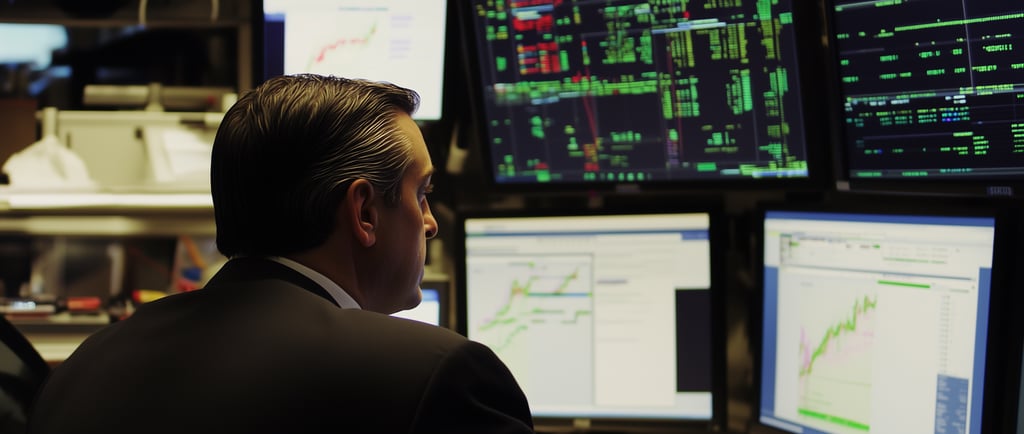

Disclosure: Clicking on links may earn me commission at no additional cost to you. Thank you for reading!
Explore index funds vs ETFs to understand their differences and find the optimal investment strategy for your financial goals.
Index Funds vs ETFs: Which is Right For You?
Disclaimer: This website and its content are for informational purposes only and is not financial advice.
ETFs offer intraday trading and often lower minimums. Index funds (mutual funds) are simpler for regular, fixed investments, and generally have slightly better tax efficiency. Consider your needs.
The Basics: Investment Funds Explained
Choosing how to invest your hard-earned money can feel like navigating a maze filled with unfamiliar terms. Two popular and often discussed investment vehicles are index funds and ETFs, or exchange-traded funds.
While both offer a way to diversify your investments and potentially grow your wealth over time, they have distinct characteristics that might make one a better fit for your individual financial goals and preferences than the other. Let's delve into the world of index funds vs ETFs and explore their nuances in simple terms to help you make an informed decision.
At their core, both index funds and ETFs are types of investment funds. Think of a fund as a big basket that holds a variety of different investments, such as stocks or bonds.
This diversification is a key advantage, as it helps to reduce the risk of putting all your eggs in one basket. Instead of buying individual stocks, which can be volatile, you own a small piece of many different companies or bonds within the fund.
What is an Index Fund?
Now, let's look at what makes them different. An index fund is a type of mutual fund that aims to track the performance of a specific market index. A market index is like a benchmark that measures the performance of a particular segment of the market.
For example, the S&P 500 index tracks the performance of 500 of the largest publicly traded companies in the United States. When you invest in an S&P 500 index fund, your money is spread across these 500 companies, and the fund's performance will closely mirror the performance of the index itself.
This passive approach to investing generally results in lower operating expenses, known as expense ratios, compared to actively managed funds where a fund manager tries to beat the market by picking and choosing investments.
Exploring Exchange-Traded Funds (ETFs)
ETFs, on the other hand, are also designed to track an index, a sector, or a specific investment strategy. However, unlike traditional mutual funds, ETFs trade on stock exchanges just like individual stocks. This is a crucial difference.
Because they trade throughout the day, their prices can fluctuate based on supply and demand, offering more intraday liquidity. This means you can buy or sell ETF shares at any point during market hours at the prevailing market price.
Updated May 16th, 2025
Share this:
Buying and Selling: Key Differences
One of the key distinctions between index funds and ETFs lies in how you buy and sell them. Typically, you buy and sell shares of an index fund directly from the fund company.
Your order is usually processed at the end of the trading day at the net asset value (NAV), which represents the total value of the fund's holdings divided by the number of outstanding shares.
With ETFs, as mentioned earlier, you buy and sell shares on an exchange through a brokerage account, similar to how you would trade stocks. This exchange-traded nature can offer more flexibility in terms of when and at what price you can transact.
Understanding Expense Ratios
Expense ratios are a vital factor to consider for both index funds and ETFs. As mentioned earlier, both generally boast lower expense ratios compared to actively managed funds. However, there can be slight differences.
Index funds offered directly by large fund providers often have very competitive expense ratios due to their scale. ETFs, too, are known for their low expense ratios, and the competition in the ETF market has driven these costs down significantly. Over the long term, even small differences in expense ratios can have a noticeable impact on your investment returns.
Tax Efficiency: An Advantage for ETFs
Tax efficiency is another area where ETFs often have an edge. Due to their unique creation and redemption mechanism, ETFs can often be more tax-efficient than traditional mutual funds, including index funds. Without getting too technical, this mechanism can limit the amount of taxable capital gains distributed to shareholders.
Index Funds vs ETFs: Which Path is Right for You?
So, when considering index funds vs ETFs, which one is right for you? The answer depends on your individual circumstances and preferences.
If you value simplicity and are comfortable with end-of-day trading, and if the minimum investment requirements of an index fund aren't a barrier, then an index fund could be a straightforward choice. They are often well-suited for set-it-and-forget-it long-term investing, such as within retirement accounts.
On the other hand, if you desire more control over when you buy and sell, appreciate intraday liquidity, and prefer the flexibility of trading on an exchange, then ETFs might be a better fit.
Their generally lower minimum investment and potential tax advantages can also be appealing. ETFs can be particularly attractive for active traders or those who want to be more tactical with their asset allocation.
Making Your Investment Decision
Ultimately, both index funds and ETFs provide efficient and cost-effective ways to build a diversified investment portfolio.
Understanding the nuances of index funds vs ETFs, such as their trading mechanisms, minimum investments, expense ratios, and tax implications, will empower you to choose the investment vehicle that aligns best with your financial goals and investment style.
Remember to carefully research specific funds or ETFs before investing and consider your long-term investment strategy.
Subscribe to Newsletter
Get updates on new Gold IRA posts, market news, and more.
By Jordan McCaleb, Investment Researcher


